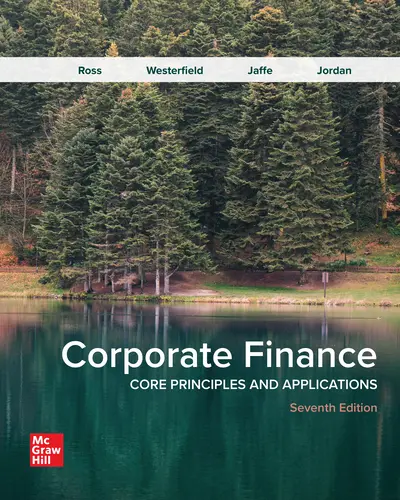My Account Details

ISBN10: 1264413114 | ISBN13: 9781264413119

* The estimated amount of time this product will be on the market is based on a number of factors, including faculty input to instructional design and the prior revision cycle and updates to academic research-which typically results in a revision cycle ranging from every two to four years for this product. Pricing subject to change at any time.
Instructor Information
Quick Actions (Only for Validated Instructor Accounts):
Corporate Finance: Core Principles and Applications was developed for the graduate (MBA) level as a concise, up-to-date, and to-the-point product, the majority of which can be realistically covered in a single term or course. To achieve the objective of reaching out to the many different types of students and the varying course settings, corporate finance is distilled down to its core, while maintaining a decidedly modern approach. Purely theoretical issues are downplayed, and the use of extensive and elaborate calculations is minimized to illustrate points that are either intuitively obvious or of limited practical use. The goal was to focus on what students really need to carry away from a principles course. A balance is struck by introducing and covering the essentials, while leaving more specialized topics to follow-up courses. Net present value is treated as the underlying and unifying concept in corporate finance. Every subject covered is firmly rooted in valuation, and care is taken throughout to explain how particular decisions have valuation effects. Also, the role of the financial manager as decision maker is emphasized, and the need for managerial input and judgment is stressed.
PART ONE: OVERVIEW
Chapter One: Introduction to Corporate Finance
Chapter Two: Financial Statements and Cash Flow
Chapter Three: Financial Statements Analysis and FinancialModels
PART TWO: VALUATION AND CAPITAL BUDGETING
Chapter Four: Discounted Cash Flow Valuation
Chapter Five: Interest Rates and Bond Valuation
Chapter Six: Stock Valuation
Chapter Seven: Net Present Value and Other Investment Rules
Chapter Eight: Making Capital Investment Decisions
Chapter Nine: Risk Analysis, Real Options, and CapitalBudgeting
PART THREE: RISK AND RETURN
Chapter Ten: Risk and Return: Lessons from Market History
Chapter Eleven: Return and Risk: The Capital Asset PricingModel (CAPM)
Chapter Twelve: Risk, Cost of Capital, and Valuation
PART FOUR: CAPITAL STRUCTURE AND DIVIDEND POLICY
Chapter Thirteen: Efficient Capital Markets and BehavioralChallenges
Chapter Fourteen: Capital Structure: Basic Concepts
Chapter Fifteen: Capital Structure: Limits to the Use ofDebt
Chapter Sixteen: Dividends and Other Payouts
PART FIVE: SPECIAL TOPICS
Chapter Seventeen: Options and Corporate Finance
Chapter Eighteen: Short-Term Finance and Planning
Chapter Nineteen: Raising Capital
Chapter Twenty: International Corporate Finance
Chapter Twenty-One: Mergers and Acquisitions (web only)
APPENDIXES
A: Mathematical Tables
B: Solutions to Selected End-of-Chapter Problems
C: Using the HP 10B and TI BA II Plus FinancialCalculators
D: Key Equations
Accessibility
Creating accessible products is a priority for McGraw Hill. We make accessibility and adhering to WCAG AA guidelines a part of our day-to-day development efforts and product roadmaps.
For more information, visit our accessibility page, or contact us at accessibility@mheducation.com
Need support? We're here to help - Get real-world support and resources every step of the way.
